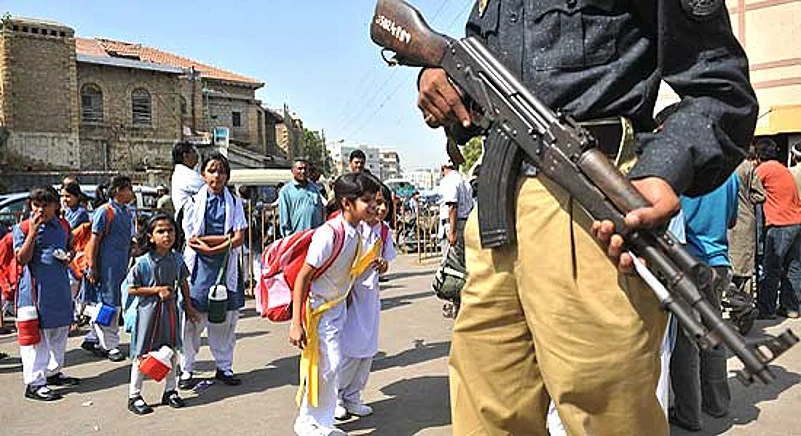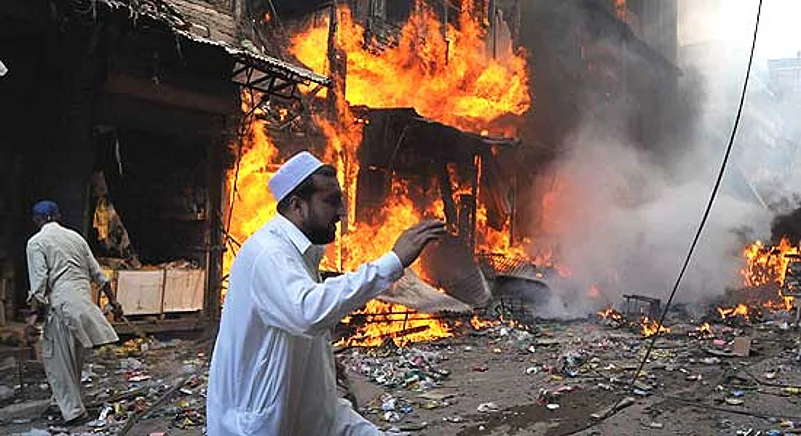Blasted Cities...
- Grand total: 268 killed, 498 injured in 13 suicide attacks across the country
- Oct 5, Islamabad: UN office attacked, five killed
- Oct 9, Peshawar: At least 52 people die in suicide attack
- Oct 10, Islamabad: GHQ under siege, 9 army personnel killed
- Oct 28, Peshawar: 92 die when a suicide bomber blows himself up in a market
***
Pakistan seems to have become the victim of a reverse osmosis of sorts. As its army marched into the Tehrik-e-Taliban Pakistan (TTP) stronghold of South Waziristan, subjecting it to relentless bombing and shelling, the militants have swooped down from the mountains to target mainland cities and towns. They trigger bombs in crowded markets, assassinate army officers and issue dire threats to educational institutions. The suicide bomber is on the prowl, mulling over his next devastating attack in his shadowy hideout, sending waves of fear across urban centres.
All this has changed the landscape of cities, the mindscape of city-dwellers. Schools are raising their boundary walls, fortifying them with barbed wire, a precaution even those invincible army officers are opting for at their houses. Vulnerable streets are being blocked off with shipping containers, giving them the look of docks. People are chary of venturing into crowded areas, more so around government buildings. The air is thick with suspicion—the stranger next to you in a bus or in the streets could well be the next suicide bomber.
At times, rumours—or stray intelligence—fan these insecurties. The people of Multan, famous for its Sufi saints, look askance at every drop dripping from their taps. Could it be poisoned, they murmur. Their fear springs from reports claiming that the TTP plans to poison the city’s water tanks. These reports seemed credible enough to prompt the Multan Development Authority to stop the supply from water tanks, and instead meet the city’s needs through an array of tubewells. For the populace, it appears the Taliban is capable of every inhuman act that the imagination can conceive.

Shock waves: A school in Karachi
Fearing the suicide bomber who kills at will, the government closed down schools as soon as the army blazed its way into South Waziristan. Last week, schools willing to organise stringent security checks, including burly guards rifling through the satchels of even toddlers, were allowed to open their gates to students. And just when you thought life in Pakistan was limping back to normalcy, panic spread in Islamabad at the discovery of shrouds that had been tossed over the boundary walls of some schools. Pinned to these were slips of paper asking the school authorities to prepare for mass funeral. Schools in the city were declared shut again.
Prolonged closure has disrupted studies, and the ambience of fear has warped the children’s psyche. For instance, the thoughts of Iman Nazir, 16, are an incredible mix of outrage against the government and sympathy for those enduring the army’s onslaught in Waziristan. “Will the government please tell me why it’s in power if it can’t protect my basic rights? Isn’t the death of my Pashtun brothers and sisters in drone attacks an infringement upon their right to life?” he asks. Take six-year-old Shahram, who’s acquainted with different types of bomb-proof material his school is utilising to secure itself. Once, children of Shahram’s age would learn to play cricket. Today, they are getting conversant with the debate over the ethics of suicide-bombing. As Shahram says, “These bombers say they will go to heaven after killing us. But I know that they will actually go to hell.”
This week, schools that opened in Islamabad resembled jails rather than educational institutions—barbed wire over their boundary walls, gates barricaded, gun-toting guards keeping watch. Even this isn’t enough to allay the tension of parents, who are petrified of suicide bombers targeting school buses. Salma Bokhari, a housewife, hires taxis daily to take her children to school and back home. “And yet, every day, nervous relatives and friends phone me to inquire whether I and my children have reached home safely,” she says.
Islamabad, as is true of most capitals, is the pride of the establishment. It has consequently become the most prized target of suicide bombers, who have already blown to smithereens the city’s elan of not so long ago. On his return from the interiors of Punjab, British social worker Chris Cork had this picturesque description of the city: “Islamabad has assumed an almost ghostly quality, both day and night, seeming depopulated and having the life drained from it to become pale and frail, lying on its bed at the foot of the Margallas and breathing shallow, panting breaths.”
Some military officers have opted for civvies and private cars to move around the city. Even this hasn’t prevented attacks on brigadiers and generals, usually targeted as they leave for work in the morning. This has sparked speculation that the militants have access to information from within the establishment. Even diplomats have exchanged fancy cars with diplomatic licence plates for those with Rawalpindi numbers and have started carrying arms. Tasneem Noorani, a former interior secretary, says, “From a safe and lovely town, it has been turned into a bunker.”
It isn’t just Islamabad that’s affected. Fresh waves of attacks across the country have seen the Karachi Stock Exchange take a severe beating, slipping below the psychologically assuring level of 9000 points. No city is more bruised than Peshawar, becoming a veritable battle-zone of the army and militants. Bombing here has become routine and deaths merely a statistical matter. Khadam Hussain, of the Bahria University, Islamabad, says, “The militants are ready to open a new front in the suburbs of Peshawar.” The TTP is indifferent to the plight of innocents, which is what lost them support in the province. Veteran journalist Rahimullah Yousafzi says, “For the TTP, the major worry should be the loss of public support in Pakistan. In particular, it has lost backing in its previous strongholds all over the NWFP.”
The TTP may have lost support, but the harried people blame the US and the government for their plight. They say America’s war on terror has sucked them into a vortex of violence from which their ineffectual government has failed to extricate the country. Some others accuse the army of nurturing the terror monster, which has now turned around to wreak havoc on the country. But this blame-game can neither mitigate the suffering of the people nor allay their fears.





















